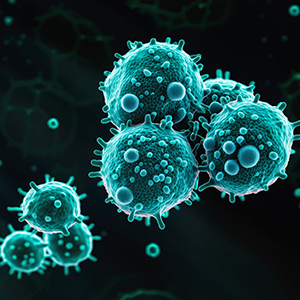-
Science Saturday: Scientists link enzyme to immune suppression in cancer
Tumors must evade the immune system to grow and spread, causing cancer. One of the ways tumor cells hide is by displaying proteins that tell immune cells that all is well. New cancer treatments, called checkpoint blockade therapies, work by telling T cells to ignore those protein markers and attack the cells. But this therapy doesn't always work.
"There are tumors that do not respond to these therapies, indicating that they must have additional mechanisms to inhibit the immune response," says Virginia Shapiro, Ph.D., co-leader of the Mayo Clinic Cancer Center Immunology Program. In a paper, published in Cancer Immunology Research, Dr. Shapiro and her team demonstrate one of those mechanisms. In tumors that overexpress the enzyme, ST8Sia6, a function of macrophages, is altered to inhibit immune response.
"In some cancers overexpression of ST8Sia6 in tumors correlates with poor outcome," says Dr. Shapiro. "In the paper, we provide the first evidence as to why ST8Sia6 expression on tumors may enhance tumor growth by inhibiting the immune response."
The enzyme ST8Sia6 boosts the body's chemical reactions related to the assembly of glycoproteins. It adds sialic acid to the ends of glycoproteins. Ultimately, the team identified a receptor and linked it to inhibition of macrophages. The receptor, called Siglec-E, recognizes the sialic acids that the enzyme ST8Sia6 adds to glycoproteins.

"Our work demonstrates that the primary effect of ST8Sia6 overexpression toward enhanced tumor growth is through inhibition of the immune response, and not directly on the rate of tumor growth itself," says Dr. Shapiro.
Siglec-E in mice is similar to Siglec-7 and Siglec-9 in humans, and the scientists show that ST8Sia6 generated ligands for Siglec-7 and Siglec-9, as well. Next, the team plans to determine whether shutting off ST8Sia6 ― alone or in combination with other therapies ― slows tumor growth in mice.
"We need to understand all the ways that tumors escape the immune response, so as to design future therapies to target each individual tumor," says Dr. Shapiro. She adds that while this work is currently funded by federal grants, it started as an idea submitted to Mayo Clinic's Center for Biomedical Discovery, which was critical to generating preliminary data to get federal funding.
For a full list of authors ― including lead author David Friedman, a predoctoral student at Mayo Clinic Graduate School of Biomedical Sciences ― author disclosures and funding, see the paper.
- To read about other ST8Sia6 research from Dr. Shapiro's lab, read "Diabetes Research Advances With New Enzyme Publication From Mayo."
- Learn more about Mayo Clinic's Center for Biomedical Discovery and immunology research at Mayo Clinic.
- Interested in cancer research? Read what's going on at Mayo Clinic Cancer Center.







